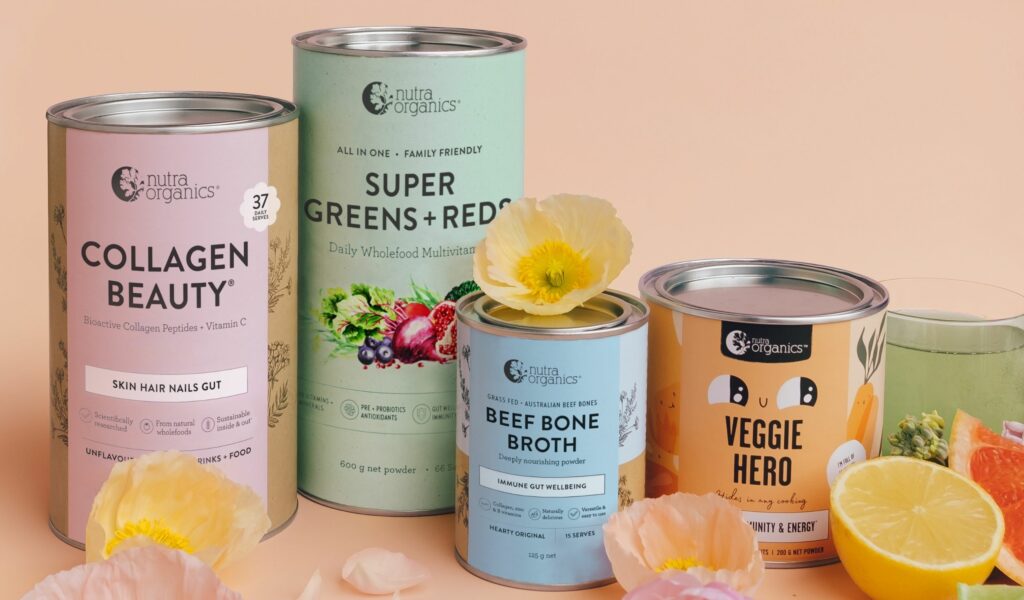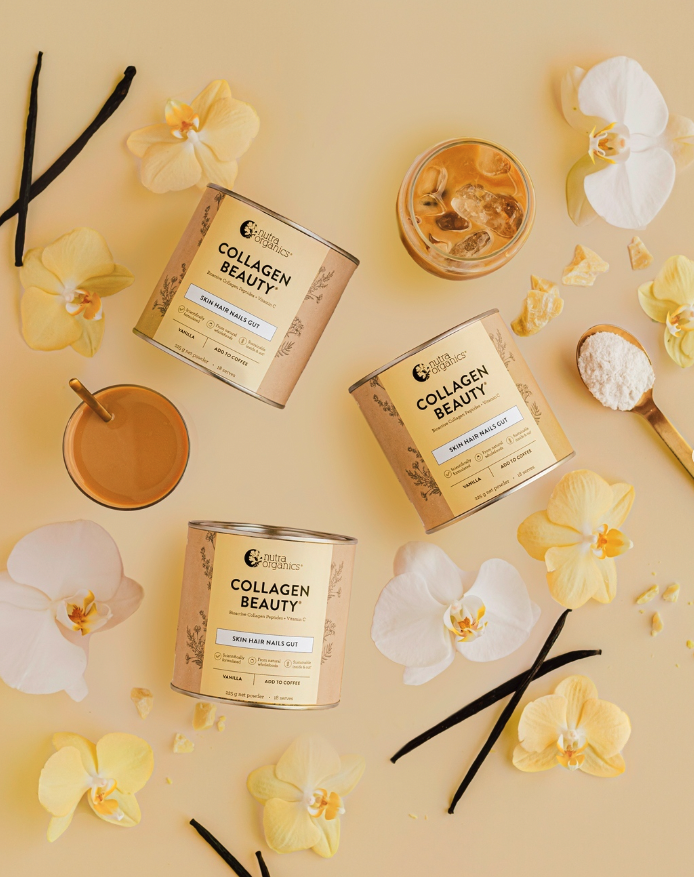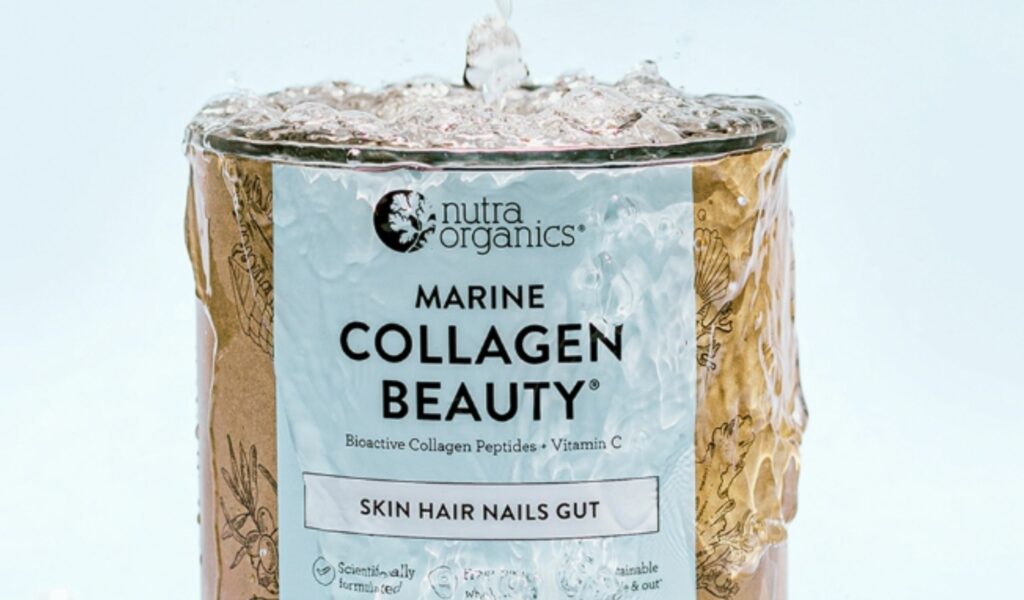
Whenever I hear about collagen and ingestible beauty, I’ve always been on the fence with it all. While I love the beauty and skincare industry, there’s a lot out there – from sunscreen to skin cycling to different acids to use for exfoliation. Frankly, it all gets overwhelming sometimes. With the vast amount of collagen and ingestible beauty products available, I put this category in the “to do later” box.
But after returning from a three-month sojourn across Europe, my skin looked terrible. The commuting, travelling, imbalanced diet and ever-changing weather conditions (rain, hail, immense shine – sometimes all in one day!) had wreaked havoc on my skin, hair and nails. My complexion was textured, dull, and I had acne breakouts that were reminiscent of my adolescence.
Back home in Melbourne, I was desperate to get my skin back to normal. The skincare products that I was using, while amazing in efficacy and actives, just weren’t cutting it. So I started looking into collagen and the benefits of ingestible beauty. Cue in Nutra Organics and their bestselling Collagen Beauty range.
Important note: This product was gifted to me, but I am not obligated to provide a review. I always test a product for at least four weeks before committing to a review. If I don’t like the product, you won’t see it on Skin School – gifted or otherwise.
The Background
Collagen is the most abundant protein in our body. In fact, our skin is made up of 75% of collagen. When we enter our mid-20s, our natural collagen production starts to degenerate. That’s why collagen supplements have taken the beauty world by storm. From improving skin elasticity, increasing skin hydration to reducing fine lines and wrinkles, consuming collagen daily comes with a slew of benefits.
Texture & Feel
I trialled the Nutra Organics Unflavoured Collagen Beauty. It’s an extremely fine powder and easily dissolves in liquid. Plus, because it’s unflavoured, I could easily start my morning with one tablespoon of powder mixed into my water, coffee or juice.
As for texture, there was none as soon as I mixed it with water – that’s a big plus in my book. The last thing I want is that gritty, powdery texture while drinking a beauty supplement.
Results on the skin
This isn’t a hyperbole, but this product is the bomb-diggity. It saved my skin, and I don’t say that lightly considering I’m very mindful of what I put in and on my body. That said, I noticed the key to success is taking this daily without fail.
After three months of daily consumption, my skin is finally back to normal – minimal to no texture, a significant reduction in breakouts and a naturally glowy complexion. It’s also helped my gut be more regular when going to the bathroom – I no longer feel so bloated all the time. But I noticed the biggest difference is in my hair and nails – hair has noticeably more volume and bounce, while my nails and cuticles are no longer dry and peeling.
Honestly, I’m kicking myself that it’s taken me this long to use collagen-ingestible beauty. It would have saved me a lot of grief when I was deep in the throes of problematic, moody skin.
I could’ve done a deep dive myself, but I thought it might be better to speak to the experts. So I interviewed Nutra Organics’ Research Nutritionist, Lisa Baker, to give us the lowdown on everything collagen and ingestible beauty.


Q: What is collagen and why is it necessary for the body?
Lisa: Collagen is a structural protein found in connective tissue throughout the body. Collagen forms very large protein fibres and networks that provide strength, and stability while allowing for flexibility. It’s needed absolutely everywhere in the body. Most famously, collagen contributes to skin’s plump, youthful appearance, but it also supports gut lining, adds strength to bones, tendons and ligaments, supports the cardiovascular system, helps blood to clot and wounds to heal, and provides a protective barrier to organs.
Collagen that you buy and take as a supplement is made from the collagen of animals. Their collagen tissues are cooked and broken down until proteins are small enough to be consumed, digested and absorbed by our bodies to be used for our own collagen synthesis. Native collagen (the way it is found in its original form) is very difficult to consume and digest, but it’s a great source of amino acids for tissue building and repair. By breaking down native collagen into much smaller molecules, we are able to eat, digest and get all the benefits from it.
Q: What are the main types of collagen available?
L: The main ‘types’ of collagen available are known as Type I, II, and III. They are very similar but have a slightly different amino acid sequence and structure. Type I is the most abundant in the body and is found in the skin, organs, bones, tendons, blood vessels, ligaments and more. Type II is found predominantly in cartilage. Type III is found in the skin, muscles, and blood vessels. Even though there are some differences between the ‘types’ of collagen fibres in their native form, they are very similar once they have been broken down into small collagen peptides that you can buy as a supplement. What is more important than the ‘Type’ of collagen you are buying, is the size of the peptide that they have been broken down into. The size of the peptide will dictate how well it is absorbed and what it does in the body. We use different collagen peptides in our three collagen products – Collagen Beauty, Collagen Body and Collagen Build – which have been shown in multiple studies to specifically target collagen regeneration in different areas of the body.
Q: What is the difference between marine collagen versus bovine collagen? How do you know which one to ingest, especially based on certain skin conditions, skin types and more?
L: The difference is all down to personal preference here, and at Nutra Organics, we love both! There’s a common misconception that marine collagen is smaller and more easily absorbed compared to bovine collagen – that would be true if you were chewing on the collagen in its native form, but once it has been broken down, you can achieve the same peptide size with marine or bovine – and they will both do the same job. Different skin conditions and skin types can all take the same collagen as collagen is essential to all skin and everyone can benefit by providing the peptides that the body needs to promote its own collagen renewal, healing and hydration. The quality of the collagen is the factor that makes all the difference. Nutra Organics sources the highest quality collagen available, backed by multiple peer-reviewed studies, for both our bovine and marine collagen products.
Q: What are the main benefits of having collagen supplements everyday?
L: For our Collagen Beauty, which contains VERISOL® collagen peptides, the benefits are noticeable improvements in skin, including skin hydration and decreased fine lines and wrinkles, as well as supporting healthy hair and nails. Collagen Build with BODYBALANCE® collagen peptides supports gaining muscle mass, and supporting muscle strength and recovery. And Collagen Body with FORTIGEL® collagen peptides supports bone strength and structure.
Q: How much should be ingested per day?
L: This is a tricky one as it depends on what you are hoping to achieve and what collagen you are using. Good quality collagen will come from a manufacturer who makes a consistent product and has clinical studies behind their product to demonstrate that their product really works. When studies have been done on a particular collagen product, you can take their recommended serving size because that is the amount that has been found to be effective. Daily servings of between 5g to 20g would be plenty. If you want to take more than that you can (there are no safety issues with consuming more) but you might not be getting any more benefit from it as there is only so much collagen synthesis your body can do in a day. It’s also important to note that collagen is not a complete protein and you don’t want it to replace other protein sources in your diet. A healthy varied diet is always best!
Q: Can you take it at any age? If not, which age ranges do you recommend?
L: People over the age of 25 will benefit the most from collagen supplementation, as that’s generally when the body starts breaking down collagen at a faster rate than regenerating it, but anyone over the age of 12 months can have high-quality collagen as part of a healthy varied diet. Kids don’t exactly need a collagen supplement – they synthesise collagen at a great rate themselves, but consuming collagen will certainly help to ensure their body has all the building blocks it needs for the job.
Q: When do you expect to see results from ingesting collagen daily? What kind of results should you be expecting?
L: This will depend on the collagen you are taking, as not all collagen supplements are created equal. If you’re taking a high-quality, well-researched collagen supplement then there should be some kind of established timeline for you to see some results. Our Collagen Beauty has been studied extensively so that we can say “results in 8 weeks”. And in a consumer perception study, 96% of women saw visible results for skin, hair, nails or gut health when consuming Collagen Beauty daily for 8 weeks. Some people see results within a few weeks (particularly with the cells that turn over the fastest like hair and nails), but by 8 weeks you can expect improved plumpness and hydration in the skin, reduced fine lines and wrinkles, and stronger hair and nails.
Q: Are there any instances where you shouldn’t be having collagen supplements?
L: Absolutely. There are conditions out there that make people prone to keloid scarring, so anything that promotes further collagen synthesis wouldn’t be a great idea. There are also skin conditions that can cause the buildup of keratin under the skin and collagen supplements may further promote that. Like any food, there will be some individuals that it doesn’t agree with so people should check with their doctors if they have any health conditions or find that they aren’t responding well to collagen supplementation.

Debunking myths about collagen and ingestible beauty
We also discussed the many myths about collagen below:
All collagen is created equal
L: Definitely not true. There is a huge difference in the quality of collagen supplements out there on the market. Do your research and find a brand you trust who sources their collagen from a well respected manufacturer. Nutra Organics clearly states which collagen peptides we use on all of our products, so people can easily learn more about the collagen peptides and their scientific studies for themselves.
Collagen supplements will help only skin
L: Not true. Collagen supplementation can help everywhere in the body! Gut, bones, muscles, joints, eyes, hair, nails! Some collagen supplements have been designed to target certain areas of the body more specifically (like our Collagen Beauty for skin, our Collagen Build for muscles, and our Collagen Body for bones) but general collagen supplementation will help the body wherever there is collagen tissue found!
Collagen is created naturally by the body, so there’s no need to supplement
L: Yes and No. Yes, the body makes it itself, but after the age of 25 you generally break down more collagen than you build. And what do you think your body makes collagen from? You can’t make it out of thin air. Collagen supplementation provides the building blocks for collagen synthesis in the correct ratios AND acts as a signalling molecule in the body to promote more collagen synthesis.
You don’t need collagen supplements if you have enough collagen in your regular diet
L: True IF you really are getting plenty of collagen in your regular diet, but I doubt you are. Collagen is very difficult to break down and absorb in it’s native form so it’s very difficult to get enough in your normal diet. If you happen to be consuming a few cups of bone broth every day you might be getting enough collagen for the benefits you want, but collagen supplementation is your best bet for making sure you are getting plenty.
It don’t work because collagen gets broken down in our digestive tract
L: A hilarious myth which doesn’t apply to collagen. Collagen being broken down is the whole point of collagen supplements. You have to break it down to absorb it and incorporate it into your own collagen matrix.
Collagen powder and protein powder are the same things
L: Technically collagen powder is a protein powder because it is made from 100% protein, but the difference is the amino acid peptide chains and the ratios that these amino acids are present in…it’s very specific to collagen. Protein powders are generally whey protein or a combination of plant proteins (eg rice and pea) to provide a full spectrum of amino acids that are for general protein intake and/or “mass gains”. So although collagen powder is a protein powder, it is very specific and targeted, where “protein powders” are more broad.



